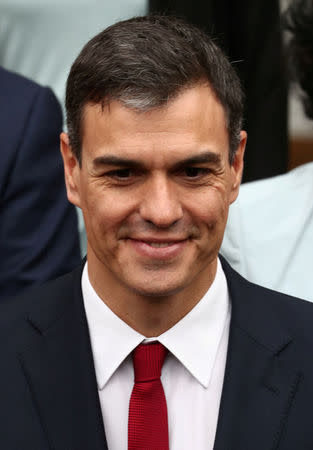New Spanish premier tries to consolidate power with migrant ship welcome

By Isla Binnie and Ingrid Melander
MADRID (Reuters) - An unexpected decision by Spanish Prime Minister Pedro Sanchez to welcome a migrant boat shunned by Italy signals he is trying to consolidate his hold on power with a new kind of consensual politics.
The Socialist leader, who toppled his corruption-tarnished predecessor Mariano Rajoy in a confidence vote on June 1, controls less than a quarter of the seats in parliament, probably blocking him from making major policy shifts.
But proposals designed to play well with disillusioned socialists after years of conservative domination could shore up parliamentary support for his minority government and win back voters who have abandoned his party, political sources and analysts say.
Sanchez waded to the rescue on Monday of 629 migrants drifting aboard the Aquarius rescue ship in the Mediterranean after both Italy and Malta denied them access to their ports. They are expected to arrive in Valencia later this week.
With the European Union struggling to agree a common migration policy, Sanchez has said little about his decision beyond saying Spain wanted to comply with its obligations under international law during a humanitarian crisis.
However, it showed early signs of winning political approval at home and abroad.
The left-wing Podemos party and centre-right Ciudadanos, which have lured former Socialist voters angered by corruption and austerity, both welcomed his intervention.
Maltese Prime Minister Joseph Muscat personally thanked Sanchez and other EU leaders are likely to be relieved that the standoff appears to have been resolved.
Inviting the ship to Spain "is a double wink, directed externally and internally", said Jose Juan Toharia, head of research and leading poll firm Metroscopia.
Among the possible audiences the gesture is aimed at, Toharia identified the EU in underlining the difference between the new Spanish government and the new anti-establishment government in Italy, which has vowed to turn back migrants.
Toharia also cited a broadly migrant-friendly Spanish society.
Arrivals of asylum seekers in Spain remain relatively low compared with those in Italy. However, Europe's border agency forecast in January a further increase in arrivals of illegal migrants to Spain by sea this year after numbers more than doubled in 2017.
Accepting large numbers carries political risks, and German Chancellor Angela Merkel is still struggling with the issue after declaring an open door policy in 2015. However, the 629 aboard the Aquarius compare with more than 1.6 million migrants who have arrived in Germany since 2014.
"NOT WITHOUT WEAPONS"
Sanchez has rejected a demand from Podemos to join the Socialists in a coalition in return for the support it gave him to oust Rajoy. Nevertheless, the anti-austerity group has pledged to support his government.
Podemos has 67 lawmakers while the Socialists account for 84 of the 350 seats in the lower house of parliament.
Ciudadanos has been more critical but it also said its 32 deputies could back the government on specific measures.
Sanchez already won approval last week when he appointed a majority of women in his cabinet and initiated a tentative dialogue with the restive region of Catalonia, breaking away from the policies of Rajoy.
The first opinion polls after the confidence vote, taken before the offer to welcome the ship, showed a jump in support for the Socialists. One conducted by GAD3 in the traditionally right-wing newspaper ABC showed the party leading.
Lawmakers from Podemos and Ciudadanos said Sanchez could also find some common ground with them to reject a censorship law, crack down on sexism and boost university scholarships.
"We are convinced that a series of measures that were backed by a majority in parliament but were vetoed by the (previous) government could move forward," Podemos senator Idoia Villanueva told Reuters in an interview.
Antonio Roldan, a member of parliament for Ciudadanos, said his party could "definitely talk" about steps to make the national television broadcaster and regulators more independent of the government.
This agenda and the fact that Sanchez may use decrees to push through reforms before they are put to parliament could confound expectations that his government will be short-lived, said Pablo Simon, a political science professor at Madrid's Carlos III university.
"His margin of manoeuvre is narrow but he is not without weapons," Simon said.
(Editing by Julien Toyer and David Stamp)

 Yahoo News
Yahoo News 